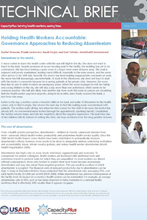
New Publication Spotlight: Interview with Rachel Deussom on Holding Health Workers Accountable: Governance Approaches to Reducing Absenteeism
A mother takes her sick child to the nearest clinic, a long walk away, but finds no one there. The next morning she returns and spends all day in an overcrowded waiting room. When it is finally her child’s turn to be seen, the only provider still on duty is eager to leave and rushes through the appointment. Next time her child is sick, the frustrated mother won’t bother visiting the clinic. When health workers are absent—or unfairly burdened with the workloads of their absent colleagues—access to care is compromised. “In a sector focused on service delivery, health workers are at the nexus,” says Rachel Deussom, coauthor of a new CapacityPlus technical brief. “You can have many elements of a good health system in place, but if health workers aren’t there to put all those things to use,” she notes, the system will fail.
When health workers are absent—or unfairly burdened with the workloads of their absent colleagues—access to care is compromised. “In a sector focused on service delivery, health workers are at the nexus,” says Rachel Deussom, coauthor of a new CapacityPlus technical brief. “You can have many elements of a good health system in place, but if health workers aren’t there to put all those things to use,” she notes, the system will fail.
Absenteeism reduces access to quality care, erodes a community’s trust in the local facility and its providers, and impacts the community’s economic productivity. “If the breadwinner of the family shows up early at a clinic hoping to get treated so he or she is well enough to work,” Deussom notes, “the absence of a health worker results in lost wages for the day. Over time, the cumulative effect of those delays to care add up.”
Many health workers are trying hard to do their part, Deussom clarifies, but sometimes the broader health system hasn’t provided them with what they need to do their jobs effectively. “Sometimes the conditions of the posts are dangerous and difficult to reach,” she explains. Some health workers may need to travel during certain hours for safety, or struggle to find reliable transportation. “They may have been promised [but not received] housing near the facility,” says Deussom, “or they haven’t been told exactly when to show up, or they haven’t been paid in weeks or even months.” Lacking supportive supervision and clear expectations, some health workers may opt to spend part of their shift conducting work in their own private practice or find a small job on the side to make ends meet. How can countries reduce absenteeism? First, says Deussom, they can understand more about the issue. Holding Health Workers Accountable: Governance Approaches to Reducing Absenteeism—a new CapacityPlus technical brief by Deussom, Wanda Jaskiewicz, Sarah Dwyer, and Kate Tulenko—looks at the cost of absenteeism, examines underlying governance issues affecting absenteeism, and describes recommendations that various stakeholders can consider implementing to reduce absenteeism.
How can countries reduce absenteeism? First, says Deussom, they can understand more about the issue. Holding Health Workers Accountable: Governance Approaches to Reducing Absenteeism—a new CapacityPlus technical brief by Deussom, Wanda Jaskiewicz, Sarah Dwyer, and Kate Tulenko—looks at the cost of absenteeism, examines underlying governance issues affecting absenteeism, and describes recommendations that various stakeholders can consider implementing to reduce absenteeism.
“The brief cites a few cases at the country level where primary health centers have been assessed; the rates of absenteeism are quite heterogeneous,” Deussom points out. “There are numerous attributions to absenteeism, such as the failure to meet working standards, inadequate incentives, or not enough information, all of which prevent managers, communities, and even professional councils from holding a doctor or a nurse accountable. Stakeholders need to evaluate what those causes may be.”
Several tools are available to help with this process. “One way to create effective incentive packages is using the Rapid Retention Survey Toolkit,” Deussom suggests. “It can help decision-makers to understand what health workers’ preferences are, to think about what kinds of incentives motivate them, and to develop an effective package of incentives.” To further address absenteeism and other productivity issues, CapacityPlus is developing a productivity diagnostic and improvement toolkit.
The technical brief is available as an interactive version and a printer-friendly document.
Related items:
Photo courtesy of Rachel Deussom.


